Michael Burke: Swan Dive
July 29, 2010 by David
Filed under Fiction, WritersCast
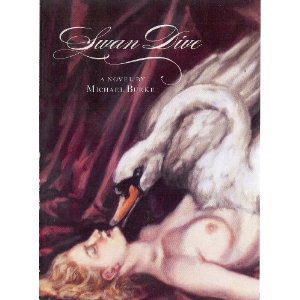 978-1929355501 – Pleasure Boat Studio/Caravel Books – paperback – $15.00 (also available as an e-book at $9.99)
978-1929355501 – Pleasure Boat Studio/Caravel Books – paperback – $15.00 (also available as an e-book at $9.99)
This is Michael Burke’s first novel, and it’s a good one. He is probably much better known as a sculptor and graphic artist; he is clearly an accomplished writer as well, and as with his art, there is a great deal of thought behind the manifestation he has chosen for this story. Michael Burke is also the son of renowned philosopher and poet Kenneth Burke, which may help explain some of his accomplishments.
While I was preparing to interview Michael about his very well written and entertaining novel, I read a fascinating profile of him and his work as an artist in the Harvard Alumni Magazine, an article that in itself is well worth reading.
This is an intellectual novel, but it is never heavy handed. The dialogue is smooth, funny, and vibrant. The story pays homage to Leda and the Swan but that motif never gets in the way of the story, and it’s not even necessary to know any Greek mythology to enjoy the book, which unfolds naturally. Of course we know there is a denouement coming, it’s a murder mystery after all, but there is plenty of complexity to keep us interested and engaged.
Swan Dive‘s main character, Johnny “Blue” Heron, is a modernized Dash Hammett sort of hero, smart, mouthy and alot more in need of help than he realizes. The book has many interesting and engaging characters, an unpredictable narrative, some sex, and an overall verve and political awareness that makes clear the author is socially engaged and has something important to say about the world we live in. You can read this book purely for fun, or as a neo-noir genre revival novel, but there’s alot more going on here for anyone who wants to delve into its many layers.
Swan Dive is a book I will recommend to mystery lovers who want a book with depth, a fast paced narrative and interesting characters. In my discussion with author Michael Burke, we had a lively discussion about this book and how he came to write it, his background as an artist, and where he is headed as a writer (there’s another Blue Heron novel in the works). I’m definitely looking forward to reading more of his writing.
Podcast: Play in new window | Download
Jason Turbow and Michael Duca: The Baseball Codes
July 22, 2010 by David
Filed under Non-Fiction, WritersCast
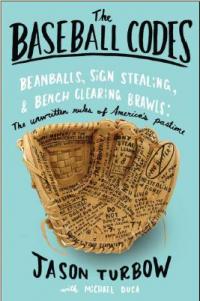 978-0375424694 – Random House – $25.00 (e-book editions also available at $9.99)
978-0375424694 – Random House – $25.00 (e-book editions also available at $9.99)
The subtitle of this book is long but tells you why almost any baseball fan (and some cultural anthropologists and sociologists) will be interested in this book: “Beanballs, Sign Stealing, & Bench Clearing Brawls: The Unwritten Rules of America’s Pastime.”
This is both an entertaining and fun read. It will work for serious fans of course, but just as well for more desultory followers of baseball, and really even readers who only have a passing interest in baseball. The basic notion is that baseball has had unwritten codes of conduct covering all sorts of on and off field behavior, probably for as long as the game as been played professionally. In years past, it would have been unusual for anyone outside of the closed professional baseball fraternity and maybe the regular baseball writers and broadcasters to know the details of how “the code” works.
The code is really a set of home grown rules, in some instances expressing sportsmanship, in other instances expressing the underlying social (and economic) values between players and teams. It is really fascinating to think about just how comprehensive human beings are in creating ad hoc systems of governance. The formal rules of the game, enforced by team owners, leagues and ultimately the Commissioner of baseball are written down and codified, as are the contracts between players and teams. The day to day rules of behavior among players, of course, are unwritten, passed on from one generation to the next, and highly subject to interpretation, ongoing disagreement and of course the change in social mores and behavior in the overall culture as well.
To write this book, Turbow and Duca spent a great deal of time talking with former and current players, coaches and managers. They are able to report back about the code, past and present, but the richness of the book lies in their many anecdotal examples of its application. And of course how the code has actually changed over the years as baseball and its players have changed is another theme of the book.
The Baseball Codes express and amplify not only the great Game of Baseball itself, but the richness of human culture and its history. This book was alot of fun for me to read, I knew some of the stories, but there were many more that were new to me, or which, by hearing the players talk about them, enabled me to understand much better what I knew about some of the interesting events in baseball history. Talking to co-author Jason Turbow was also great fun. He’s a passionate observer of the sport of baseball, and knows how to tell great stories. It’s the middle of the 2010 baseball season as this interview is posted, and a great time to listen to some baseball lore. And the Jason maintains an active blog that will keep fans up to date on current code behavior, also fun and recommended.
Podcast: Play in new window | Download
Publishing Talks: David Wilk interviews Bob Stein
July 18, 2010 by David
Filed under Ebooks and Digital Publishing, PublishingTalks, Technology, The Future
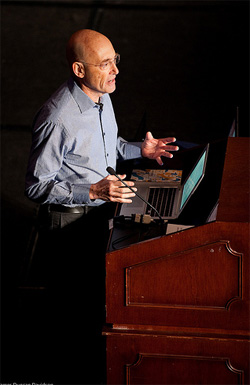 In this series of interviews, called Publishing Talks, I have been talking to book industry professionals about the future of publishing, books, and culture. This is a period of disruption and change for all media businesses. How will publishing evolve as our culture is affected by technology, climate change, population density, and the ebb and flow of civilization and its economics?
In this series of interviews, called Publishing Talks, I have been talking to book industry professionals about the future of publishing, books, and culture. This is a period of disruption and change for all media businesses. How will publishing evolve as our culture is affected by technology, climate change, population density, and the ebb and flow of civilization and its economics?
I hope these Publishing Talks conversations will help us understand the outlines of what is happening, and how we might ourselves interact with and influence the future of publishing as it unfolds.
These interviews give people in the book business a chance to talk openly about ideas and concerns that are often only talked about “around the water cooler,” at industry conventions and events, and in emails between friends and they give people inside and outside the book industry a chance to hear first hand some of the most interesting and challenging thoughts, ideas and concepts being discussed by people in the book business.
Bob Stein is for me one of the great visionary innovators and someone I greatly admire. He most recently co-founded The Institute for the Future of the Book, which quite modestly describes itself as “a small think-and-do tank investigating the evolution of intellectual discourse as it shifts from printed pages to networked screens. We are funded generously by the MacArthur Foundation, and affiliated with the University of Southern California. We are located in Brooklyn, NY and London, UK.” Bob’s bio includes founding the excellent Criterion Collection of classic films, which he ran for 13 years, as well as The Voyager Company, which produced more than 75 innovative multi-media projects in CD-ROM formats. Subsequently, Stein started Night Kitchen to develop authoring tools for the next generation of electronic publishing. That work is now being continued at the Institute for the Future of the Book.
In our conversation Bob talked a bit about his background and his history of working in publishing as lead in to a wide ranging discussion of digital publishing issues. Bob’s vision of how reading and books work in the digital, networked social environment – “books as conversation” as well as or perhaps instead of “books as objects” – and how authors and readers interact in the emerging environment is compelling. Bob has a deep experience that combines conceptual and hands-on work on so many of the issues that concern anyone interested in books and reading which for me makes his point of view so important to experience.
Podcast: Play in new window | Download
Lee Kravitz: Unfinished Business
July 15, 2010 by David
Filed under Non-Fiction, WritersCast
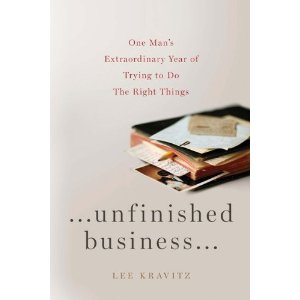 978-1596916753 – Bloomsbury – Hardcover – $25.00 (also available as e-book in various formats $9.99)
978-1596916753 – Bloomsbury – Hardcover – $25.00 (also available as e-book in various formats $9.99)
Well admittedly I might have liked Unfinished Business because I am roughly the same age as the author, have been through similar experiences in the same era, and like Lee Kravitz, have to confess to being something of a workaholic. Like him, when I look back on my past, I worry about some of the people I used to be friends with I no longer see, and doubtless, like him, have some “unfinished business” in my life that I’d be better off dealing with.
Today there must be literally thousands, hundreds of thousands of people who share many of Lee Kravitz’s experience of losing his job and having a crisis of identity, of being, and who like he did, feel a desperate need to reintegrate their lives, and their singular sense of self. Not everyone will have the opportunity to take the journey that he did, a full year of exploration and reconnecting with family, friends, teachers, people who literally made him who he is today.
I don’t think you have to literally share Lee’s direct experience, or feel as fragmented as lost as he did then to gain deeply from reading his book and sharing his journey. Lee spent many years as a journalist and editor, and writing seems to come easily to him. Many of his experiences are brilliantly described, and his honesty and clarity go a long way to making this book work for readers. This book can be transformative for many people who feel that modern life has separated them from those they once felt closest to, perhaps inspiring them to close their own circles and remake their own lives. Enough people have responded that way for the author to create a website “My Unfinished Business” on just that subject. I suspect that if you like this book, or even our conversation about it, his site is well worth a visit.
I very much enjoyed talked to Lee about his book and some of the stories about his family, friends and others whose stories he told in Unfinished Business. He’s as good a storyteller talking as he is writing.
Podcast: Play in new window | Download
Publishing Talks: David Wilk interviews Jim Mairs about The Red Book
July 11, 2010 by David
Filed under Publishing History, PublishingTalks
 In this series of interviews, called Publishing Talks, I have been talking to book industry professionals about the future of publishing, books, and culture. This is a period of disruption and change for all media businesses. How will publishing evolve as our culture is affected by technology, climate change, population density, and the ebb and flow of civilization and its economics? Publishing Talks interviews help us understand the outlines of what is happening, and how we might ourselves interact with and influence the future of publishing as it unfolds.
In this series of interviews, called Publishing Talks, I have been talking to book industry professionals about the future of publishing, books, and culture. This is a period of disruption and change for all media businesses. How will publishing evolve as our culture is affected by technology, climate change, population density, and the ebb and flow of civilization and its economics? Publishing Talks interviews help us understand the outlines of what is happening, and how we might ourselves interact with and influence the future of publishing as it unfolds.
These interviews give people in the book business a chance to talk openly about ideas and concerns that are often only talked about “around the water cooler,” at industry conventions and events, and in emails between friends and they give people inside and outside the book industry a chance to hear first hand some of the most interesting and challenging thoughts, ideas and concepts being discussed by people in the book business.
After nearly 40 years with W.W. Norton, former v-p, senior editor and director of production Jim Mairs left the company in 2002 to found his own company, Quantuck Lane Press, which is distributed by W.W. Norton. He is mainly responsible for the existence of this stunning and important publishing project, The Red Book. This is how it is described in the Norton catalog: “The most influential unpublished work in the history of psychology.”
And this is Jung himself, describing his work on this book from 1914 to 1930:
“The years, of which I have spoken to you, when I pursued the inner images, were the most important time of my life. Everything else is to be derived from this. It began at that time, and the later details hardly matter anymore. My entire life consisted in elaborating what had burst forth from the unconscious and flooded me like an enigmatic stream and threatened to break me. That was the stuff and material for more than only one life. Everything later was merely the outer classification, the scientific elaboration, and the integration into life. But the numinous beginning, which contained everything, was then.”
I’ve had the pleasure of knowing Jim Mairs for many years and wanted to talk to him about the “inside story” of this incredible publishing project, from the physical to the almost spiritual elements of the project. For anyone interested in the way truly special books can still be published in this modern era of publishing, or for anyone interested in The Red Book as an icon of Jungian psychology, I hope this discussion will be valuable and interesting, as it was for me.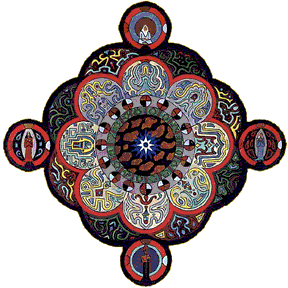
Podcast: Play in new window | Download
Gene Kritsky: The Quest for the Perfect Hive
July 8, 2010 by David
Filed under Non-Fiction, WritersCast
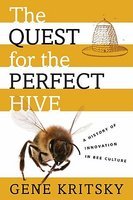 978-0195385441 – Oxford University Press – Hardcover – $24.95
978-0195385441 – Oxford University Press – Hardcover – $24.95
I have never kept bees, but am in love with honey, and the idea of beekeeping has always fascinated me. Gene Kritsky, who describes himself as “stung with the love of bees,” has written a wonderful book that will appeal to serious beekeepers, amateur bee lovers and even general readers with an interest in the history of humanity’s relationship with nature. The book is beautifully illustrated with amazing photographs, drawings and woodcuts representing hundreds of years of beekeping history.
Humans discovered honey thousands of years ago and have been working with these amazing insects for a very long time. What is interesting to the novice reader is how little beekeeping has changed. There have been many innovations in beekeeping, especially so during the past couple hundred years, but traditional beekeeping methods still exist in many parts of the world. And there is much that we can learn from past practices to help us understand how to stave off the epidemic of hive collapse that has become prevalent in so many places during the past few years.
Kritsky uggests that beekeeping’s long history may provide us with clues to help modern beekeepers fight the decline in honey bee numbers. Kritsky takes readers through the history of beekeeping, from early mud-based horizontal hives to the ascent of the simple straw skep (the inverted basket which has been in use for over 1,500 years), from the Golden Age of hive design in Victorian England up to and into the present day. In concise terms, aided by illustrated exampes, he talks about what has worked, what has not worked, and sometimes the things we have forgotten about hives of the past that might help counter the threats to modern bees and beekeeping. While scientists have now sequenced the honey bee genome and advanced our knowledge, we still keep bees in hives that have not changed very much during the past hundred years. Kritsky argues that we must start inventing again if we are going to save our bees. Thus the search for the “perfect hive” continues.
Gene Kritsky is a master of his subject in both depth and breadth, and thus is an easy author to interview. Doubtless he could talk in depth for hours about bees and maintain the listener’s interest. It was a pleasure to talk to him about this interesting and unusual book, and I am confident that listeners will enjoy our conversation as well.
Podcast: Play in new window | Download
Publishing Talks: David Wilk interviews David Steinberger
July 4, 2010 by David
Filed under Publishing History, PublishingTalks, The Future
 In this series of interviews, called Publishing Talks, I have been talking to book industry professionals about the future of publishing, books, and culture. This is a period of disruption and change for all media businesses. How will publishing evolve as our culture is affected by technology, climate change, population density, and the ebb and flow of civilization and its economics? Publishing Talks interviews help us understand the outlines of what is happening, and how we might ourselves interact with and influence the future of publishing as it unfolds.
In this series of interviews, called Publishing Talks, I have been talking to book industry professionals about the future of publishing, books, and culture. This is a period of disruption and change for all media businesses. How will publishing evolve as our culture is affected by technology, climate change, population density, and the ebb and flow of civilization and its economics? Publishing Talks interviews help us understand the outlines of what is happening, and how we might ourselves interact with and influence the future of publishing as it unfolds.
These interviews give people in the book business a chance to talk openly about ideas and concerns that are often only talked about “around the water cooler,” at industry conventions and events, and in emails between friends and they give people inside and outside the book industry a chance to hear first hand some of the most interesting and challenging thoughts, ideas and concepts being discussed by people in the book business.
David Steinberger is well known now as the CEO and President of The Perseus Books Group. Perseus is in many ways, a creation of the unusual business conditions that have marked the book industry over the past dozen years. The company began as a relatively small independent book publisher, growing over time via acquisitions of usually unwanted or under appreciated business units of other companies. Today it is made up of about 10 seperate imprints. Its six main publishing divisions include PublicAffairs (non-fiction), Running Press (fiction and non-fiction titles), Basic Books (non-fiction), Da Capo (non-fiction), Vanguard (fiction and non-fiction), and Avalon Travel (travel guides). Perseus also publishes academic books, including college textbooks from Westview Press.
In addition to publishing, Perseus acquired Client Distribution Services (renamed Perseus Distribution), Consortium (specializing in mostly independent literary and political presses) and most of the assets of Publishers Group West (PGW) in daring and innovative bankruptcy purchase, so that today it is by far the largest distributor of client publishers in the North American market. With Steinberger as CEO and Joe Mangan as COO (and aided by strong financing from its parent company), Perseus has crafted what appears to be a very successful strategy for navigating changeful times, including an early and deep commitment to digital publishing, a diverse set of publishing imprints, a decentralized management system based around a set of core services shared by internal resources as well as clients, and a willingness to experiment with new ideas (including Vanguard’s no-advance, high royalty publishing program as well as a variety of interesting digital initiatives).
In my conversation with David Steinberger, I wanted to learn more about how he sees Perseus today, as well as a sense of his vision for the future, not only of Perseus itself, but the publishing industry as a whole. I think listeners interested in the future of publishing and book distribution will find this discussion useful and interesting on a number of levels.
Podcast: Play in new window | Download
Marc Simont: The Beautiful Planet: Ours to Lose
June 20, 2010 by David
Filed under Art and Photography, Children's Authors, WritersCast
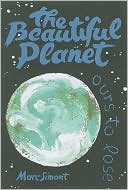 978-1935212-09-6 – Easton Studio Press – Paperback – $15.00
978-1935212-09-6 – Easton Studio Press – Paperback – $15.00
The Beautiful Planet: Ours To Lose is an impassioned anti-war cartoon book by one of America’s foremost illustrators. Marc Simont’s drawings, taken from five decades of editorial cartooning, capture the essence of a brooding Nixon, a smiling Reagan, a bland Bush One, and a dumbfounded Bush Two as they prosecute their wars. Simont’s fierce portrayals of the Military-Industrial Complex are intimately linked to his passionate indignity on behalf of all civilians, soldiers, and prisoners who have suffered.
Continually struck by the majesty of the planet as it floats in space like a jewel, Simont asks, will it survive? Born in Paris in 1915 to Catalonian parents (his father was himself a world renowned illustrator), Marc Simont spent his childhood in France, Spain and finally the United States, where he settled in 1934. After serving time in the U.S. Army during World War II, Simont went on to illustrate over a hundred books working with a wide range of authors, including Margaret Wise Brown, Red Smith, and James Thurber. Simont received the Caldecott Medal in 1957 for his illustrations to A Tree is Nice by Janice May Udry and a Caldecott Honor in 1950 for The Happy Day by Ruth Krauss. He is the author/illustrator of seven books, most recently The Stray Dog (2001), which won yet another Caldecott Honor, was chosen by The New York Times as one of the ten best illustrated books of the year, became an ALA Notable Children’s Book and received the Boston Globe-Horn Book Honor Book Award.
Internationally acclaimed for its grace, humor and beauty, Marc Simont’s art is in collections as far afield as the Kijo Picture Book Museum in Japan. He was chosen as the 1997 Illustrator of the Year in his native Catalonia and received the Hunter College James Aronson Award for Social Justice Journalism in 2008.
Interviewing Marc about this terrific book was a special occasion for me. I love the illustrations he has done for so many exceptional children’s books, many of which I know well, having read them to my own children. I was lucky to have the opportunity to work with him in producing The Beautiful Planet, which collects the pithy, humane and piercing political cartoons he has been making and publishing in The Lakeville Journal since the 1940’s. In this conversation, we talked about his early life, coming to America, his early work as an illustrator, his many well known collaborators, and of course his political cartoons that are collected here in this, his newest book.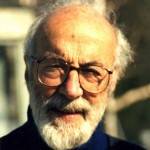 Marc’s approach is never to attack, but always to expose fallibility. He is a wonderful man whose work is marked by a love for humanity and an appreciation for actual human beings; he is a true humanist and a brilliant artist.
Marc’s approach is never to attack, but always to expose fallibility. He is a wonderful man whose work is marked by a love for humanity and an appreciation for actual human beings; he is a true humanist and a brilliant artist.
Podcast: Play in new window | Download
Publishing Talks: David Wilk interviews Dan Halpern
June 8, 2010 by David
Filed under Publishing History, PublishingTalks, The Future
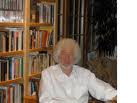 In this series of interviews, called Publishing Talks, I have been talking to book industry professionals about the future of publishing, books, and culture. This is a period of disruption and change for all media businesses. How will publishing evolve as our culture is affected by technology, climate change, population density, and the ebb and flow of civilization and its economics? Publishing Talks interviews help us understand the outlines of what is happening, and how we might ourselves interact with and influence the future of publishing as it unfolds.
In this series of interviews, called Publishing Talks, I have been talking to book industry professionals about the future of publishing, books, and culture. This is a period of disruption and change for all media businesses. How will publishing evolve as our culture is affected by technology, climate change, population density, and the ebb and flow of civilization and its economics? Publishing Talks interviews help us understand the outlines of what is happening, and how we might ourselves interact with and influence the future of publishing as it unfolds.
These interviews give people in the book business a chance to talk openly about ideas and concerns that are often only talked about “around the water cooler,” at industry conventions and events, and in emails between friends and they give people inside and outside the book industry a chance to hear first hand some of the most interesting and challenging thoughts, ideas and concepts being discussed by people in the book business.
In May, 2010, Dan Halpern was honored by the Poetry Society of America along with the Academy of American Poets and NYU’s Creative Writing Program on the occasion of the fortieth anniversary of the Ecco Press (the publishing imprint of which he is the founder). Aside from being well-known as a successful publisher of quality literature, Dan is himself a poet, writer and editor of a number of important anthologies. Along with his mentor, Paul Bowles, he founded the literary magazine Antaeus (out of which Ecco originally was born). He is currently the editorial director of Ecco Press, which is now an imprint of HarperCollins. He has received many grants and awards, including fellowships from the Guggenheim Foundation and the National Endowment for the Arts.
While I do not know Dan well, we have some friends in common and shared experiences as editors of literary magazines and a deep interest in poetry. I wanted to talk to him for the Publishing Talks series, as he has been able to maintain his deep commitment to publishing important literary work, continuing to write and edit himself, within a commercial context during a period of massive change in the publishing business. I think his perspective on books and writing, past, present, and future, is a valuable one, and instructive for many of us in the book business whose expectations are being severely challenged by the state of the current book marketplace. Dan’s commitment and dedication to writing, ideas, art and culture inform his outlook on the past, present and future of publishing and books.
Podcast: Play in new window | Download
Tatjana Soli: The Lotus Eaters: A Novel
June 4, 2010 by David
Filed under Fiction, WritersCast
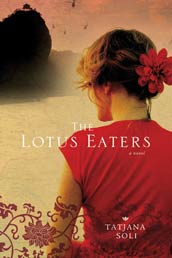 978-0312611576 – St. Martin’s Press – Hardcover – $24.99 (also available as an e-book)
978-0312611576 – St. Martin’s Press – Hardcover – $24.99 (also available as an e-book)
I know I am not alone having read both Tatjana Soli’s The Lotus Eaters and Karl Marlantes’ Matterhorn – they are unavoidably linked as both are set in Vietnam during the American war. Of course they are incredibly different in outlook, approach and story, but reading them together is a wonderful experience. As Writerscast listeners know, I loved Matterhorn – I do think it is the great novel of the Vietnam War that we have been waiting to experience for several decades.
At the same time, Tatjana’s novel is simply remarkable. She writes beautifully, inhabits her characters, their place and time, their suffering, challenges and transcendent moments. As she told me in her interview, she fell in love with the Vietnam of that era from afar, and learned everything she could about it in order to be able to write this story. Her main character is a young photographer, Helen, who comes to Vietnam early in the war, mainly because her brother died there, and she is drawn to the place where he lost his life, to figuratively solve the mystery of his death. But that is just the beginning of her journey. The war, the soldiers and other journalists, and the people of Vietnam overtake her. She becomes deeply connected to this place and time. Soli brilliantly portrays the landscape and the people of Vietnam, the suffering and horror of a seemingly endless war, and the way that war overtakes every element of human and natural life.
Helen falls in love with another photographer, Sam Darrow, a grizzled veteran who teaches her how to cope with war, survive, thrive, document, participate, suffer and love the danger and energy of men at war. But the truest, and deepest story is her love for Linh, an exceptionally complicated Vietnamese former soldier, who has gone to work for the American news agency Helen works for. At the end of the book, which thankfully avoids the cliched approach of much modern fiction, Helen and Linh journey out of Vietnam through Cambodia, an even more horrendous landscape of death and together find their way to safety, a harrowing journey that mirrors where they have traveled emotionally through the course of the novel.
A woman among men sees war more clearly than most, I think; in this book, that vision focuses and transforms the reader as well. Tatjana Soli’s story about writing this book and what it means to her is great to hear. I think she is a terrific writer, worth reading, and well worth listening to as well.
Podcast: Play in new window | Download
